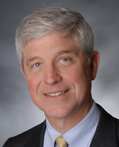Annual Report 2015
Executive Director's Message
A Focus on Members

Thomas M. Connelly, Jr.
ACS Executive Director & CEO
The American Chemical Society (ACS) is guided by its vision and mission—“to improve people’s lives through the transforming power of chemistry,” and “to advance the broader chemistry enterprise and its practitioners for the benefit of Earth and its people”—which are supported by four goals: Provide authoritative and comprehensive chemistry-related information, advance member careers, improve chemistry education and communicate chemistry’s value to the public and policymakers.
In everything we do here at ACS, we strive to live up to our vision, mission, and goals. Furthermore, as we position the Society for the 21st century, we are critically reexamining our activities and approaches to ensure our resources are directed toward our most important and useful services and programs for members, staff and the public.
In 2015, that meant we launched ACS Central Science, a free, highly selective, interdisciplinary journal, as part of our commitment to open-access publishing. Meanwhile, our established journals continued to provide a highly respected scientific publishing platform for authors and readers, with impressive impact factors and growing numbers of citations. We also introduced ACS2Go to optimize full text access to our journals on smartphones and tablets.
Our award-winning Chemical & Engineering News experimented throughout the year with new forms of storytelling, including “Top Startups to Watch” and a “Talented 12” package that highlighted innovative young chemists who are tackling global problems. In a collaboration with the Spanish organization Divúlgame.org, C&EN began offering a selection of content in Spanish.
Beyond C&EN’s audience, ACS conveyed the impact and excitement of chemistry to the general public through press releases, press conferences, videos, podcasts, social media postings and community events that reached a potential audience numbering in the hundreds of millions. In addition, the Society’s outreach to Capitol Hill helped lead to passage of federal legislation that strengthened science education, chemical safety and research and development support.
Chemical Abstracts Service (CAS) registered the 100 millionth unique chemical substance in the CAS Registry—the world’s largest database of unique chemical substances—and celebrated the Registry’s 50th anniversary. CAS also introduced new products in 2015, including PatentPak™, which helps scientists quickly zero in on the chemical information within patent documents.
In addition, ACS launched ChemIDP, an online tool to help graduate students and post-docs with self-assessment, skill strengthening, career exploration and goal setting. We served the K-12 educational community through multiple programs including the American Association of Chemistry Teachers. Dow Chemical pledged a $1 million gift as ACS’s sole founding partner in the organization, whose membership topped 3,000 as of the end of 2015, its first full year in existence.
ACS’s own membership at year-end 2015 was slightly lower than in the prior year, and efforts are underway to bolster growth, in part by strengthening support and value for industrial chemists. For example, our Presidential task forces explored employment issues, including how to meet the industry’s workforce needs. We visited CEOs and chief technology officers (CTOs) and held the first ACS Chemical Sciences CTO Summit to hear about the challenges and opportunities that industry and our industrial members face, and to learn how we can better serve their needs. And we collected and reported employment data about ACS members and new graduates as part of our extensive career services.
Also in 2015, the Society held two national and six regional meetings. And in partnership with six other chemical societies from around the Pacific Basin, ACS hosted the International Chemical Congress of Pacific Basin Societies, also known as Pacifichem. This scientific conference, which is held every five years in Honolulu, offers a chance for chemists from around the globe to talk face-to-face about their work.
Pacifichem is just one manifestation of the increasing globalization of chemistry. Several of our other programs are designed to assist our members in this new reality, helping them connect to what’s going on around the world. For instance, ACS members helped to establish chapters in countries including India and Taiwan, met with Cuban chemists to explore mutual interests and enhanced CAS’s global presence in nations including Mexico, Brazil, China, Korea and Russia.
We also continued to nurture the chemists of the future. For instance, our 20th Anniversary Appeal for the ACS Scholars Program—which provides scholarships to underrepresented minority undergraduates who want to work in chemistry-related fields—attracted nearly $1.7 million in new gifts and pledges from generous donors. The Petroleum Research Fund awarded $18.6 million in grants for education and research.
ACS as a whole surpassed its 2015 financial targets thanks to the leadership of Board Chair Pat N. Confalone, 2015 President Diane Grob Schmidt, Immediate Past President Tom J. Barton, and President-Elect Donna J. Nelson. As a result of strong performance in ACS Publications and CAS and continued streamlining efforts in several administrative units, the Society ended the year with a net from operations of $16.6 million, some $3.2 million more than budgeted, marking our 12th consecutive year of positive operating performance.
On a more personal note, 2015 marked my first year as ACS Executive Director and CEO following a long career in industry. I’d like to thank my predecessor, Madeleine Jacobs, as well as the members and staff of ACS for their warm welcome and their advice as I transitioned from member to CEO of the largest scientific society in the world.
Before that transition, I knew that ACS members were dedicated, but I didn’t realize the true depth of that commitment until I joined the staff. Through your role as Chemistry Ambassadors participating in a host of programs and activities, including National Chemistry Week, Chemists Celebrate Earth Day and contacts with legislators and the media; your service as Councilors, committee members, and division and local section officers and members; and your conversations with friends and neighbors about the joys of our science, you have made a difference in the way the world views and utilizes chemistry. On behalf of the ACS staff and Board of Directors, I thank you.
